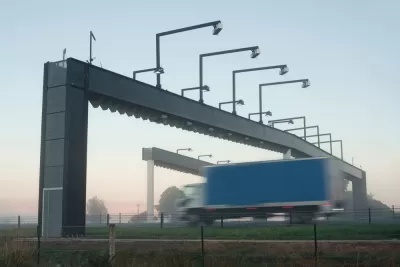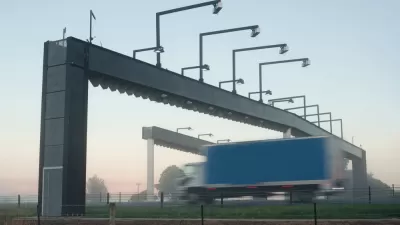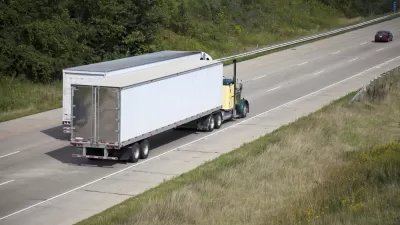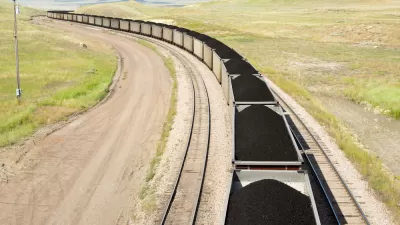The nation's sole truck-only tolling program survived its first lawsuit after a federal judge dismissed litigation brought by the American Trucking Associations, ruling that the proper venue was state court. ATA believes it is unconstitutional.

The ruling hands a victory to Rhode Island Department of Transportation Director Peter Alviti, who in August had filed a motion in the U.S. District Court for the District of Rhode Island to have the lawsuit dismissed, reports Eleanor Lamb for Transport Topics on March 20.
In his plea for the suit’s dismissal, Alviti cited the Tax Injunction Act [TIA], which restricts the power of federal district courts to prevent the collection or enforcement of state taxes, and the 11th Amendment of the U.S. Constitution.
Note that Chief Judge William E. Smith did not rule on the merits of the lawsuit, American Trucking Associations [ATA] v. Alvitia, Rhode Island Department of Transportation, filed in the same district court a month earlier, which dealt with the issue of whether the toll program “impedes the flow of interstate commerce.” Rather, his ruling dealt with the issue of court venue.
“The facts are clear that the fees, while dubbed tolls, are really a highly targeted and sophisticated tax designed to fund infrastructure maintenance and improvements that would otherwise need to be paid for by other forms of tax-generated revenue,” Smith’s decision said.
“As such, the court is without jurisdiction under the TIA; the federal case must be dismissed and ultimately heard in the courts of Rhode Island.”
Why truck-only tolls?
The court document notes that, according to the General Assembly, large trucks cause 70% of the damage to Rhode Island’s roads and bridges, but contribute less than 20% of the state’s annual revenue for infrastructure projects.
In neighboring Connecticut, new Democratic Governor Ned Lamont had campaigned on the issue of truck-only tolls, viewing Rhode Island as a model, but has since changed his position to include passenger vehicles in the toll schedule so as to capture more revenue.
Not giving up
Matt Cole, news editor for Commercial Carrier Journal, reports on March 21 that American Trucking Association will likely pursue their case in state court.
“ATA is reviewing the decision and considering next steps but looks forward to vindicating its underlying claims on the merits, whatever the venue," said ATA Deputy General Counsel Rich Pianka.
ATA claims that it is the selective manner in which the tolls are applied, not the fact that only heavy-duty trucks are being tolled, that violates the constitution's interstate commerce clause. Lamb explains:
Under Rhode Island’s toll system, a hauler within the state who needed to pass through one gantry repeatedly for dispatches would be charged less than a trucker moving through the state who encountered multiple gantries.
ATA’s lawsuit argued that truck tolls discriminate against interstate commerce. If a state charges a user fee for access to channels of interstate commerce, that fee has to be a fair approximation of use and cannot discriminate between in-state and out-of-state interests.
With the current litigation now resolved to the Rhode Island Department of Transportation's satisfaction, it remains to be seen how fast they can construct eleven tolling gantries to complete the truck-tolling system. A shortfall of revenue caused the department last month to cut $28 million from bicycle and pedestrian projects and trim $96 million from its highway repaving budget.
FULL STORY: Court Dismisses ATA’s Lawsuit Against Rhode Island Truck Tolls

Alabama: Trump Terminates Settlements for Black Communities Harmed By Raw Sewage
Trump deemed the landmark civil rights agreement “illegal DEI and environmental justice policy.”

Planetizen Federal Action Tracker
A weekly monitor of how Trump’s orders and actions are impacting planners and planning in America.

Why Should We Subsidize Public Transportation?
Many public transit agencies face financial stress due to rising costs, declining fare revenue, and declining subsidies. Transit advocates must provide a strong business case for increasing public transit funding.

Understanding Road Diets
An explainer from Momentum highlights the advantages of reducing vehicle lanes in favor of more bike, transit, and pedestrian infrastructure.

New California Law Regulates Warehouse Pollution
A new law tightens building and emissions regulations for large distribution warehouses to mitigate air pollution and traffic in surrounding communities.

Phoenix Announces Opening Date for Light Rail Extension
The South Central extension will connect South Phoenix to downtown and other major hubs starting on June 7.
Urban Design for Planners 1: Software Tools
This six-course series explores essential urban design concepts using open source software and equips planners with the tools they need to participate fully in the urban design process.
Planning for Universal Design
Learn the tools for implementing Universal Design in planning regulations.
Caltrans
Smith Gee Studio
Institute for Housing and Urban Development Studies (IHS)
City of Grandview
Harvard GSD Executive Education
Toledo-Lucas County Plan Commissions
Salt Lake City
NYU Wagner Graduate School of Public Service





























